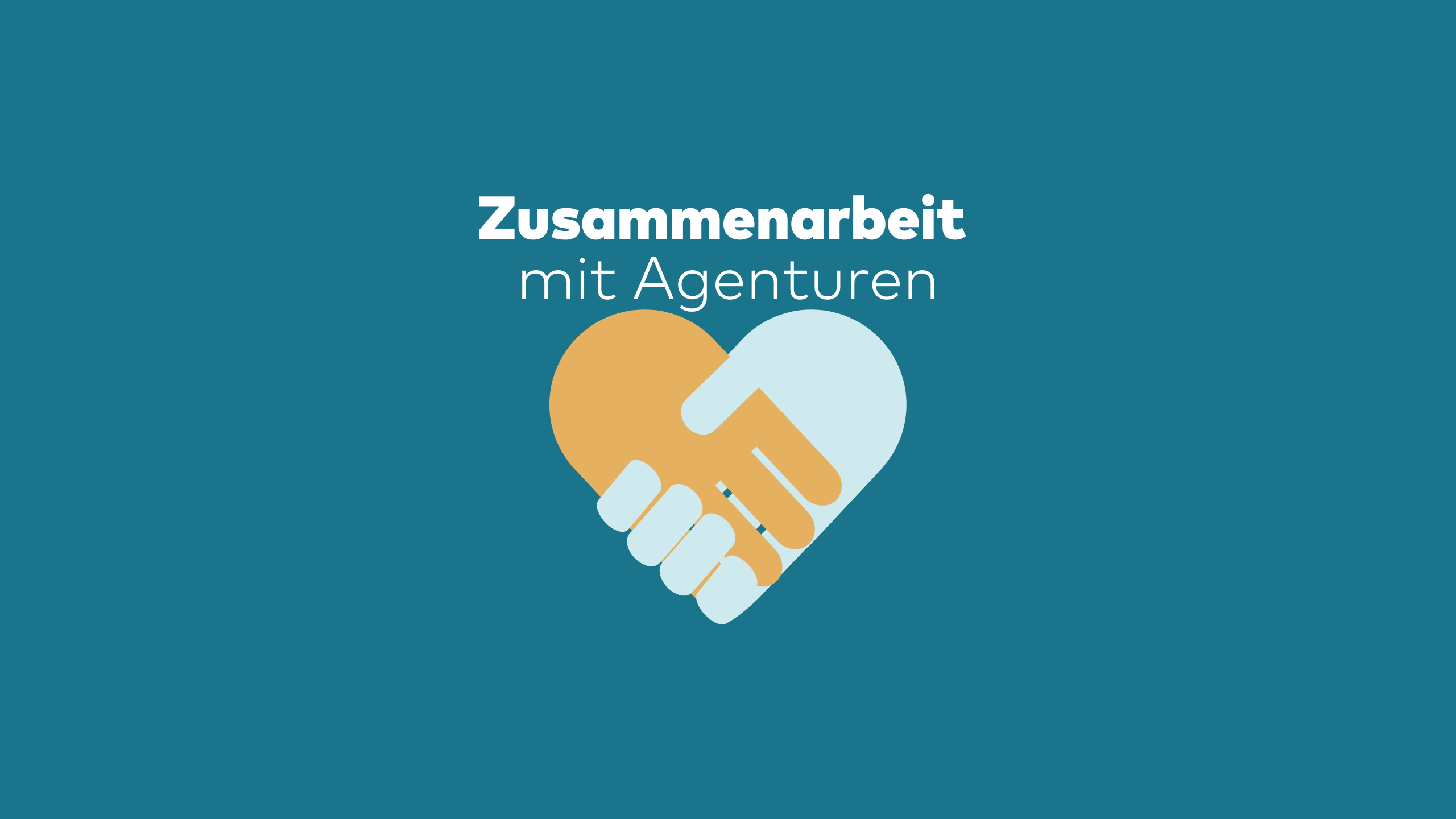
A recipe for success for newbies & advanced marketers
Your time is precious. To quote probably one of the most popular motivational sayings: You only live once. What do you do with a limited good in the best case? You divide it up and try to get the most out of it. If you find yourself answering the following questions, you can be sure you’ll be enriching your time with our tips for working successfully with agencies .
So you want to work with agencies or you already do. It works better that way.
We read from your intention or your actions that you want to improve things in or at your company. You already have one or more agencies on your side or are looking for suitable service providers. Maybe you need a new website, help with SEO, a corporate video or someone to take care of your social media presence. All these services are widely offered by a thriving agency landscape. The only thing left to do is to grab it! At second glance, however, two essential questions arise: Which agency/agencies is/are right for me and how do I ensure that the collaboration will work well?
We are happy to help: Here you will find tips on how to choose the right agency (full-service or specialized). Now you can find out how to work successfully with the agency of your choice.
Back to the roots: A short excursion into the Stone Age.
If you compare the past with today, many probably answer with the same phrase: “Everything used to be better.” Why? “Because it was easier somehow.” Hmm, okay. A phone was only there to make calls, mom to cook, dad to work, and the ad agency to design flyers with Paint. Oops, forgot spoiler warning: Warning, these statements are old and dusty. And simply outdated.
Excuse me, it's 2023
Linnea, TikTokerIn a time before agencies could help us with services in areas such as online marketing, programmatic advertising, e-commerce, SEO, content marketing, customer journeys, sales funnels and KPI monitoring, we would probably have shaken our heads looking at our present day. How are you supposed to keep track of everything? After all, it all has to be done skillfully, planned, coordinated and tested for success. True too, but hey: humanity is successful because we hold the gift of creation, optimization and communication. We bagged the mammoth through tool development and coordinated teamwork. We turned a canned phone into today’s beloved smartphone by combining skills. So let us help you improve the way you work with agencies to get all the services you want to optimize your business.
The list of ingredients for your recipe for success with agencies
Okay, now let’s get down to brass tacks. You would like to work together with one or more agencies successfully, trustfully and, if required, harmoniously in the long term. You want to see good results for the money you invest in the agency. You don’t want to be disappointed. If you stick to the following ingredients, you will be delighted with the result.
- Communication
- Objective & Briefing
- Timings & Feedback
- Tools & Transparency
- Payment
- Trust & Intuition
Are you ready? Let’s take a deep dive together! Beforehand, it might be good to know that this is not just about fancy tools or methods. Rather, we would also like to show you what kind of attitude it takes to make the cooperation between you and your agencies successful.
„Many cooks need not spoil the broth”
Adapted German vernacularAdd an extra large portion of communication
Heard many times, often disregarded: Communication is key. Still one of the most important guiding principles for basically every situation in life. Communication is central to successful collaboration. If it is neglected, this can lead to misunderstandings, tensions and ultimately conflicts. To prevent this, make sure you communicate clearly and consistently with your agency from your end.
Think of it this way: When you start working with an agency, you build a relationship. Functioning relationships are always based on openness, trust and exchange. Love relationships, friendly relationships, business relationships – they all have the same basis. You listen to each other, ask questions and understand what the other part needs to be happy. Your agency wants to make you happy with its services. Therefore, tell her exactly what you need to be happy and provide all the necessary information, documents, accesses, etc. – because this in turn will please the agency. A small cycle of joy.
In the event of errors, repair rather than new
Address dissatisfactions, errors, or deteriorating performance early, sometimes showing understanding and giving the agency a chance to make corrections. A new agency selection process is time consuming and costly and should only be taken as a last resort. Sometimes it takes a little time to develop into a well-coordinated team. But once the spark has been ignited, it’s worth investing in a long-term relationship. And if you feel that communication from the agency is faltering, it may help to ask for a new contact person. Just ask nicely.
Very important, before you decide on an agency: Clarify exactly whether all the services you need from your side are also offered. Sounds logical? This is true, but it is often neglected and causes frustration (on both sides). Also, it says a lot about an agency if they give you a permanent contact person – if not, that’s a red flag. Not having communication go through a fixed person can actually only lead to chaos.
New Work opens doors – also in collaboration with agencies
New Work breaks with old business behaviors and challenges “tried and true” work models. People want a work-life balance, would like to combine child and career easily and make the option of a home office the standard. Through this movement, even more aspects are being questioned, such as the relationship with or interaction with service providers. An agency is no longer seen as a mere service provider, but as a partner (here we are back to the topic of “relationship”). Actively involve your partner in your network, your processes and your daily business – you will see how valuable this is for communication and collaboration.

Honest hot tip from the agency:
My favorite customers are the ones who just call me when something is wrong. No cryptic mails, no misinterpretation, no ghosting. Just exchange directly, that usually works best.
Carla K., project manager of an online marketing agency- Better too much communication than too little.
Yay! The first step is done. Read on and complete your guide with 5 more points!
Objective & briefing please measure accurately
In the first phase of cooperation, it is important to get to know each other. This is also in the spirit of the agency. Try to brief agencies as promptly as possible, again falling back on ingredient number 1: open and honest communication. A successful business relationship can be built by clarifying expectations properly right at the beginning. You can’t imagine (depending on your previous experience) how many tough, exhausting, and quite costly proofreading loops could be prevented by proper goal setting and briefing. Define your goals as precisely as possible and explain what you need to be satisfied with the outcome.
An example: You approach an agency with the wish for a “modern, beautiful webshop”. But what exactly do “modern” and “beautiful” mean to you? The conception of it is subjective. Therefore, clarify the following questions in advance for yourself or together with your agency:
- What criteria decide for me whether a web store is modern (beautiful, appealing, intuitive, etc.)?
- Are the challenges “only” in the design or do I have specific technologies in mind?
- Are there perhaps existing websites or stores that I like (or parts of them) and can serve as an example for my agency?
- And if I’m honest: Is the desire to drive up leads and conversions actually behind this “modern and beautiful” wording? Because then other services besides web design and programming should be used…
The answers to these questions are worth their weight in gold to your agency. A detailed briefing is always an expression of appreciation. You invest time and effort in the collaboration. Here’s a briefing guide that will have your agency beaming with delight. Alternatively, feel free to proactively ask your agency if you can answer specific questions for them. If necessary, you will also receive a questionnaire to fill out directly from your agency at the start of the project.

Honest hot tip from the agency:
Sometimes I really ask myself with my customers: What do you actually want from me? No offense, but I can’t read minds. I can only deliver if you tell me what you want. That would make everything faster, more relaxed and more successful.
Micha T., graphic designer in a design agency- Better too much communication than too little.
- Explain exactly what you want.
Go on! Read on and complete your guide with 4 more points!
Timings & feedback cut into equal cubes
Small recap to start with: Your time is precious. The time of your agencies, too. So let’s use our time together as efficiently as we can!
Hand in hand with the briefing, you always work out a schedule (roadmap) together with your agencies to get the project off the ground. Timings for individual milestones are set so that you know when to expect interim results. It is important to note that timings sometimes apply not only to your agencies, but also to you. Depending on the project, agencies need information from you (CI, access, content, etc.) and then it’s up to you to deliver the required building blocks on time.
Jour Fixes & Proper Feedback Formulation
It is very important for you to give your agency constructive feedback as soon as possible after you have received something to check. The team needs your approval or correction requests in order to meet the schedule. In the course of this, there should also be a regular exchange of information about any delays (technical difficulties, sickness absences, etc.). Fixed dates, for example, which are integrated into the roadmap at regular intervals in the form of jour fixes, are suitable for this purpose.
And even if it costs you a little more time: Take a close look at all the interim results and formulate as precisely as possible (in writing/by telephone) what you like and what you don’t like so much, and above all, why. Sentences like “Somehow I don’t like that” or “Well, that doesn’t appeal to me at all now” only express that you are dissatisfied. But not how to make you happy. Better is “Somehow I don’t like this, I think bigger product images would make sense and the color of the font is too dark for me.” A real gamechanger.
Also, try to keep the number of “emergencies” low. Always ask yourself: is it really an emergency at 4:30 in the afternoon, or do several people now have to work questionable overtime because of me? Also, can this maybe wait until tomorrow and I call my agency right at 9am so there is more time? Thank you ☺

Honest Hot-Tipp from the Agency:
Of course I have favorite customers. But it doesn’t take much to achieve this status. Friendly, rational, reliable: No, this flyer doesn’t need to be made today, I’ve scheduled it for the end of the week. Is that feasible? YES!
Patrick D., communication designer in an advertising agency- Better too much communication than too little.
- Explain exactly what you want.
- Stick to timings & give constructive feedback.
Slowly you will become a pro! Read on and complete your guide with 3 more points!
Mix in a handful of tools & transparency
To support your collaboration with agencies, it is helpful to agree on certain tools for communication purposes. Workboards can be shared on project management platforms such as Jira, Asana or Trello and are very conducive to agile collaboration. Such a ticket system is even more recommended if you work with several agencies. Here, all information is available centrally in one place, to which everyone involved has access and everyone knows what needs to be done. This also gives all stakeholders the opportunity to exchange information directly with each other if necessary and to shorten distances. This saves time and money – and creates clarity about the status of your project. But be careful not to use too many channels. Together with your agencies, commit to as few tools as possible to avoid misunderstandings.
Along with the tools comes transparency. All tasks and information are available for all participants to see. If you and your agencies reliably and completely enter all innovations into the system, there is little to stand in the way of a smooth process. You can get even more clarity about your project through (monthly) reporting. Your agencies create documents for you in which the interim statuses and initial results are recorded. As a rule, agencies offer you this service on their own. By the way, transparency can be found in all areas of your collaboration: in the entire communication, in the briefing, in the feedback and also in the following point: the payment.

Honest Hot-Tipp from the agency:
Tickets are like movie tickets: they are clear and give you exactly the info you need in a nutshell.
Marbin K., developer in a marketing agency- Better too much communication than too little.
- Explain exactly what you want.
- Stick to timings & give constructive feedback.
- Use tools to your advantage & provide clarity.
Over halfway done! Read on and complete your guide by just 2 more points!
Garnish with payment
Transparency pays off in the truest sense of the word. The basis of your cooperation with an agency is your joint contract and the scope of services and remuneration agreed therein. Here, ingredient number 1, communication, is again of essential value. If at the beginning it is defined exactly what you expect, it can be priced accordingly. However, you should keep in mind that projects often don’t turn out quite as expected. Therefore, discuss with your agency how additional work is compensated and how many correction loops are included in the services. This clarity prevents a “rude awakening” when the bill comes.
Fixed prices & cost-effort comparison
In this context, a fixed price (depending on the project) should often be viewed critically: Of course, this helps you optimally in the first moment with the cost calculation, but at a fixed price there are also only fixed services. If it becomes apparent during the process that your project would need other optimizations to achieve the optimum result, you have unfortunately lost out. Of course, an agency will give you a quote before the project starts so that you have an estimate of cost and performance (if they don’t, that’s another red flag). Nevertheless, make sure in advance how you will deal with the fee in case of readjustment. This way you make sure you stay within your budget.
In order to keep an eye on your costs at all times, a target/actual comparison can be carried out at regular jour fixes. Here you look together at the previous effort and the planning provided for it (> cost calculation). Does that still cover it or is there an additional expense on the horizon? This short step saves from frictions and unforeseen high bills.

Honest Hot-Tipp from the agency:
What costs nothing is worth nothing.
Lena M., SEO Manager in an online marketing agency-
- Better too much communication than too little.
- Explain exactly what you want.
- Stick to timings & give constructive feedback.
- Use tools to your advantage & provide clarity.
Final spurt! Read on and complete your guide by just 1 more point!
Serve with confidence & intuition
Last but not least: Trust the process. You maintain open communication. You briefed well. You give feedback in a timely manner. You keep track of your project through a shared system. You know what you’re up against in terms of costs. Congratulations! You do everything you can to ensure successful collaboration with agencies. Now it’s just up to you to trust your agencies as well. You work with experts who want the best for you and your project. Value their skills and remember that you can only benefit from their experience. And if you don’t understand something, don’t criticize directly, but let it be explained to you first.
You should still listen to your intuition. Especially if you are in the agency selection process. Depending on the project, intensive cooperation is required. If you feel that you are not in good hands with an agency, then invest time and money better in further search. Whether an agency suits you is decided by the services offered as well as by the interpersonal relationship. It has to fit, just like any other partnership. Then the result will more than delight you!

Honest Hot-Tipp from the agency:
Sometimes customers think they already know the solution. They basically just look for an agency to implement their idea. You can do that, but it sucks. Hey, we want more for you.
Fine B., copywriter in a communications agency-
- Better too much communication than too little.
- Explain exactly what you want.
- Stick to timings & give constructive feedback.
- Use tools to your advantage & provide clarity.
- Trust & listen to your intuition.
Congrats! Now your collaboration with agencies can only get better.